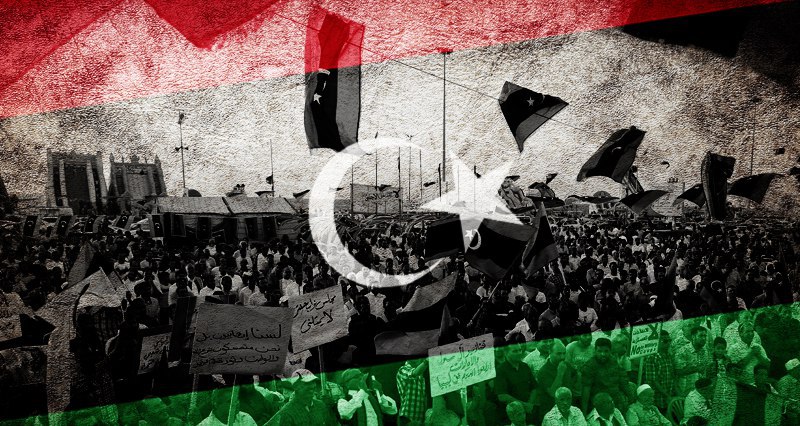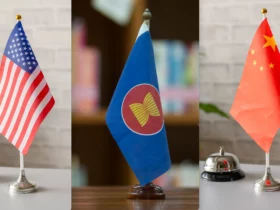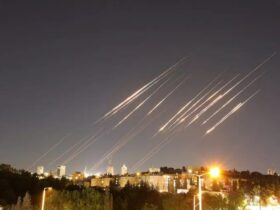The signing of a memorandum between Erdoğan and Sarraj regarding maritime boundaries was one of the most crucially important events for Turkey in 2019. The memorandum was important as a geopolitical counterbalance to the Greece-Israel-Egypt block which opposes Turkey in the region. The memorandum sets new contours of Turkish control in the Eastern Mediterranean. Our analysis of the geopolitics of Mavi Vatan will help clarify the critical nature of this memorandum.
my latest The #Geopolitics of the #Turkey–#Libya #Maritime_Deal @GiorgioCafiero @GulfStateAnalyt @RaufNMammadov
Signing a memorandum of understanding with Libya was one of the most important steps it has taken in this regard. https://t.co/l2dnCbSskX— Omid Shokri Ph.D. (@ushukrik) December 30, 2019
Why is the memorandum so important?
According to the agreement, the continental oil and gas shelves of Cyprus are Turkey’s responsibility. Turkey can use the memorandum as an argument to continue the exploration of oil and gas fields on the Cypriot shelf. Also, strengthening of Turkey’s control over the Eastern Mediterranean contributes to the Turkish Stream project which is competing with the East med gas pipeline (Italy, Greece, Cyprus and Israel are involved in the project).
Mavi Vatan nedir? Libya Anlaşması neden önemli? Anlaşma bölgedeki oyunu bozacak mı? Doğu Akdeniz’de ne yaşanıyor? Cem Gürdeniz, Cüneyt Özdemir’e yorumladı ➤https://t.co/uZxal7mLtA pic.twitter.com/slRsNnVT5t
— CNN TÜRK (@cnnturk) January 2, 2020
Political escalation in Libya
The civil war in Libya, which began in 2011 (provoked as a result of Western intervention) is now in full swing. The country today has 2 centres of power– the UN-recognized government of Sarraj (GNA) and the House of Representatives in Tobruk, which supports General Haftar. Despite the formal division of the political camp of Libya into two fronts, to date, more than 10 countries are indirectly involved: thus, Haftar has the support of Saudi Arabia, the UAE, Egypt, France and Russia, while Sarraj is supported by Qatar, Turkey and had previously received active support for by Italy (but their support has weakened).
The GNA was formed on December 17, 2015 on the basis of the Libyan Political Agreement signed in the city of Skhirat at the initiative of the UN. The agreement aimed to draft a constitution for Libya, to end the civil war in the country and to help the fight against terrorism. It should be noted that the large-scale goals of the agreements have not been realized- for instance, the country still has no constitution. An interesting peculiarity is the terms of validity of the GNA under this agreement – for example, it is limited to a year, and in case of failure to create a constitution, the agreements provide for extension of the GNA’s powers for 1 year.
#Libya @FedericaMog & @KoblerSRSG discussed implementation of Lybian Political Agreement https://t.co/Y9NCfNf3nI pic.twitter.com/SKQ6U9FJVM
— European External Action Service – EEAS ???????? (@eu_eeas) February 23, 2016
“The term of the Government of National Accord shall be one year as of the date of granting it a vote of confidence by the House of Representatives. In case the constitution was not finalized during its term, it shall be renewed automatically for one additional year only. In all cases, the term of the Government shall end immediately after the formation of the executive authority as per the Libyan Constitution or the expiry of its specified duration, whichever is earlier.”
Thus, on the basis of these agreements, the GNA is legal until December 2017. Due to the instability in the country and many contradictions between Tripoli and Tobruk, the GNA has not been able to develop a new draft constitution even with the support of the UN. The Lybian Political Agreement had little effect on the political settlement of the civil war, despite the fact that they contained an algorithm for action to restore the unity of Libya. The presence of many powers involved in the conflict provoked a protracted crisis, and the active development of terrorist groups in the country was also destabilizing for the success of political regulation of the situation.
Haftar, once a supporter of Gaddafi who later tried to overthrow him, was a political dissident and lived in the US for more than 20 years; it has been suggested that he has ties with the CIA. When the uprising against Gaddafi began in Libya, he returned to the country. On March 2, 2015, Haftar was appointed as commander of the armed forces defending the Parliament. On April 4, 2019, Haftar announced a new offensive on Tripoli as part of a military operation in a video message entitled “Operation to Free Tripoli.” He said that the operation was a response to the Libyan people’s demand “to put an end to the power of militants and terrorists in the city”. In December 2019, Haftar announced that he planned to take Tripoli before New Year’s Eve.
Surprise: Former CIA asset Khalifa Haftar — who lived for 20 years in suburban Virginia near CIA headquarters and, since 2011 NATO regime change, has conquered nearly half of Libya — insists the country supposedly is not ready for democracy. https://t.co/W6ak7N6gm8
— Ben Norton (@BenjaminNorton) January 11, 2018
The memorandum of military cooperation and maritime boundaries, signed by Sarraj and Erdoğan, was heavily criticised by Haftar. However, it is difficult to say whose interests Haftar is pursuing – receiving the support of such diverse players as Saudi Arabia, France, the UAE and Egypt, he also has earned the support of Russia, which shows that the general has no unified (single) political strategy. Saudi authorities are actively using him as an opponent of the Muslim Brotherhood, Russia apparently sees him as a general in the image of Gaddafi, while France is attracted to Haftar’s secular agenda, as well as its long established and stable cooperation with the general.
However, if we proceed to the analysis of Tripoli, we see that there are several interest groups to factor in as well. The structures that form the basis of support for Sarraj are multidirectional, some groups tend to draw their own diplomatic line, the main support for Sarraj is provided by the The RADA Special Deterrence Forces, the basis of their brigade is Madhalites (the head of RADA Abdul-Rauf Kara is an adherent of the doctrine of Saudi Sheikh Al-Madhali), experts sometimes characterize RADA group as “Haftar Trojan horse in Tripoli”: the Madhalites are actively participating in anti-GNA operation, led by Haftar, and sometimes are even called the “strike army” of the LNA. In addition to the Muslim Brotherhood, Sarraj has the support of numerous groups, some of which were involved in the 2011 overthrow of Gaddafi, some of whom were even linked to al-Qaeda (e.g. some memberts of the Zintan Brigades-block). Sarraj does not have full control over these groups, as evidenced by the attack on the GNA headquarters led by some members of the Misrata Brigade in early December. Internal conflicts in Tripoli have regularly led to armed clashes between different groups.
The provocations of a “Parallel Devlet”
In October, Middle East media reported that Turkey was possibly redirecting terrorists from Syria to Tripoli to support Saraj. The statement came from Libyan National Army spokesman Major General Ahmed al-Mismari . Given that Turkey is heavily involved in the fight against terrorism in the region (the efficiency of their efforts is evident in recent joint operations with Russia in Syria), such statements seemed groundless.
However, the information was later corroborated by reports of the transfer of fighters from the Free Syrian Army who took part in Operation Olive Branch in Afrin in the northern Aleppo province. Information emerged that al-Hamza Division, the Suqour al-Sham Brigades, were allegedly being prepared for departure. The flights, according to sources, took place from Gaziantep airport in December 2019 (the first flight allegedly took place on 25 December). The information is currently being verified. If this proves to be true, there is a strong possibility that the operation is being conducted to discredit Erdoğan, who is in the process of becoming the leader of the Sunni world.
Successful operations in Syria, a geopolitical turn from globalism to multipolarity (which started after the pro-American coup attempt in 2016), the strengthening of Turkey’s contradictions with NATO – all these factors are considered by globalist structures as Turkey turning from friend to foe. Thus, Erdoğan, the strong leader of the Republic of Turkey, supported by the population and coping with many complex challenges in the Middle East, obviously could represent a great threat to the weakening globalist dominance in the region.
The 2016 pro-American coup d’état attempt, initiated by FETO, revealed the existence in Turkey of a ‘Parallel Devlet’ (parallel state), a “state in a state,” a hierarchically constructed system of alternative management of political processes. It was these Gülenist groups who were behind the special operation to disrupt cooperation between Turkey and Russia, who actively pursued a pro-Western agenda, and who had the ultimate goal of overthrowing Erdoğan to build a pro-American Turkey focused primarily on cooperation with the West.
If the information about the transfer of militants from Syria to Libya via Gaziantep is finally confirmed, it will be crucial to launch an official investigation to find out who carried out this action in order to undermine Erdoğan’s image as an effective fighter against terrorism. The official dispatch of troops to Libya, to which Erdoğan openly referred in December and what was ratified by the Parliament on the 2 of January, is part a strategy to maintain Turkey’s control in North Africa, a logical step in Turkey’s foreign policy strategy to support the Muslim Brotherhood, and to some extent, a guarantee of preserving Turkey’s life-changing Mavi Vatan Memorandum, while the transfer of militants is an operation that could provoke the formation of new terrorist centers in Libya and discredit Erdoğan’s image as a guide for sovereign, independent and realistic policies. Obviously, Erdoğan has certain connections with a number of Islamist groups, which are a legacy of previous stages of Turkish politics: the influence of globalists and Islamists was an important components. But, after breaking with FETO and defeating the putschists, Erdoğan’s policy has been described by many as a kemalist-sunni course (‘Yeşil Atatürk’), where the national interests of Turkey and the protection and strengthening of its sovereignty come first. This pragmatic approach has restored Erdoğan’s popularity among Turkish military circles, which traditionally, despite all political transformations, continue to play an important role in the country.
Libya’dan, Arap Birliği Genel Sekreteri’ne ‘dış müdahale’ tepkisi https://t.co/1rI0Y77j0k pic.twitter.com/9UccG5qyht
— ANADOLU AJANSI (@anadoluajansi) January 2, 2020
However, this new Sunni Kemalism, which has guaranteed the success of Erdoğan’s policies, sometimes comes into conflict with the preservation of inertia in contacts and connections with a number of radical Islamist structures. Moreover, a peculiarly understood “loyalty” can be used by those remaining segments of the parallel state that have survived the outing and dispersal of the Gulenists. Therefore, on the one hand, Erdogan finds himself under the fire of the direct opposition, as well as from the new political structures set up by ex-AKP groups of Ahmet Davutoğlu and Abdullah Gül (former associates of Erdoğan). They are possibly the ones responsible for distorting the national course by engaging with radical Islamic groups.
All this is evident in Erdoğan’s excessive support for Sarraj, which is gradually beginning to diverge with a balanced realistic calculation of national interests. Clearly Sarraj will not be able to effectively resist Haftar’s forces in the long run, let alone the control of the whole country. Therefore, it is high time to reconsider unconditional support of Sarraj and work together with Russia, which is interested in multipolar reorganization of the strategic space of the Middle East, and find new ways of resolving the Libyan issue.
In recent years, we have repeatedly seen that the aggravation of Turkish-Russian relations not only harms stability in the region, but is also the work of those forces that are interested in weakening (or even eliminating) “Yeşil Atatürk” Erdoğan from his position as national leader and legislator of political trends in the Sunni world. Conversely, whenever Turkey and Russia reach a consensus through reasonable compromises, it contributes to strengthening both Turkish positions in the region and Erdoğan’s own stability. If Erdoğan does not follow this course, he will find himself between increasing pressure from the West and emerging tensions with Russia over the Libyan issue.

















Leave a Reply